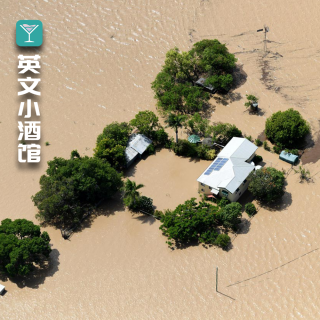
介绍:
Hi everyone and welcome back to Global Village. 欢迎回来你们最喜欢的板块【小酒馆·大世界】. Today we have a new guest speaker, but also...actually a recurring guest speaker, 今天是我们的老朋友Simon, Simon from New Zealand. Hi Simon.
Kia ora , 你好.
First of all, let me, just out of my concern before we get into the recording, let me ask you about the recent natural disaster that happened in your part of New Zealand. 最近新西兰是有一个cyclone, right?
We did. So about three weeks ago, four weeks ago, we had really large that the largest cyclone on records parts of New Zealand. My city was the worst affected area.
I'm sorry to hear that.
We had about 10 days with no power, no electricity, no internet, or most people no internet.
10 days?
So no phones, no internet, no power, some places, no water. It was quite scary.
That must be really tough. I thought, shall we just talk about the sort of disaster preparedness and also self reliance in New Zealand, perhaps in this topic?
Sure.
All right. So first things first, is this common, you said it’s the largest, but does it happen often or regularly, this cyclone or similar natural disasters?
Yeah, New Zealand has had its fair share of natural disasters, about ten twelve years ago we had the Christchurch earthquakes which destroyed the city of Christchurch. We had the Kaikoura earthquakes.
And then in 2019... volcano?
Yes, we had White Island, the volcano eruption, and there were I think 8 people killed in that, terrible event.
It sounds scary because when last time I was in New Zealand with my parents, my parents actually went to that island, went to that exact scene, and then that's really scary to think about.
Now I'm going to ask you, I know it's still very, very fresh, I hope you don't mind, you mentioned about this cyclone sort of like the electricity was gone, water was gone.
So how badly were people affected?For example, in terms of casualties or just normal family, are they out of supplies or their homes flooded, for example.
There was about ten deaths in the country, so people died... drowned due to floods or falling debris. There are a few people died. A lot of people were made homeless, either temporarily or they have now totally lost their homes.
Within my company, we have one of my staff members, her house was totally flooded out, almost 2 meters of mud right through the house.
So she lost everything. It was terrible. I think it is about 5,000 homes which have been destroyed, which for small... for my city which has around 60,000 people, it's a lot.
That is a very high percentage. I'm just a little bit curious, may be curious is not the right word, but will they get for example compensated by like for example insurance company or is there disaster relief funds to help them rebuild their homes?
Absolutely, while the average Kiwi loves to complain about the government. The reality is that our government compared to most around the world is very generous. Whenever there are natural disasters, they will put in support packages for families, for businesses and for individuals.
There's already a number of financial support products available provided by the government. Most people, I think almost everyone would have insurance.
So while it's very upsetting to lose your house to lose your property, there will be people who are financially much worse off. But most people will be able to claim and get some reimbursed.
Compensation or relief funds. I see that's nice to know actually. What about yourself. Last time we talked, I remember you’re telling me that you are or you were less affected.
So it's a bit of a secret, but I'm a secretly a bit of a prepper. I love to be prepared for things. My wife always complains that I buy too much camping equipment. However, for the cyclone, yeah.
Are you one of those people that has his own secret bunker and just prepared for the sort of end of the world scenario?
I probably would if I was allowed to, my wife won't allow me to do that. No, but I, compared to most p
大家还在听

